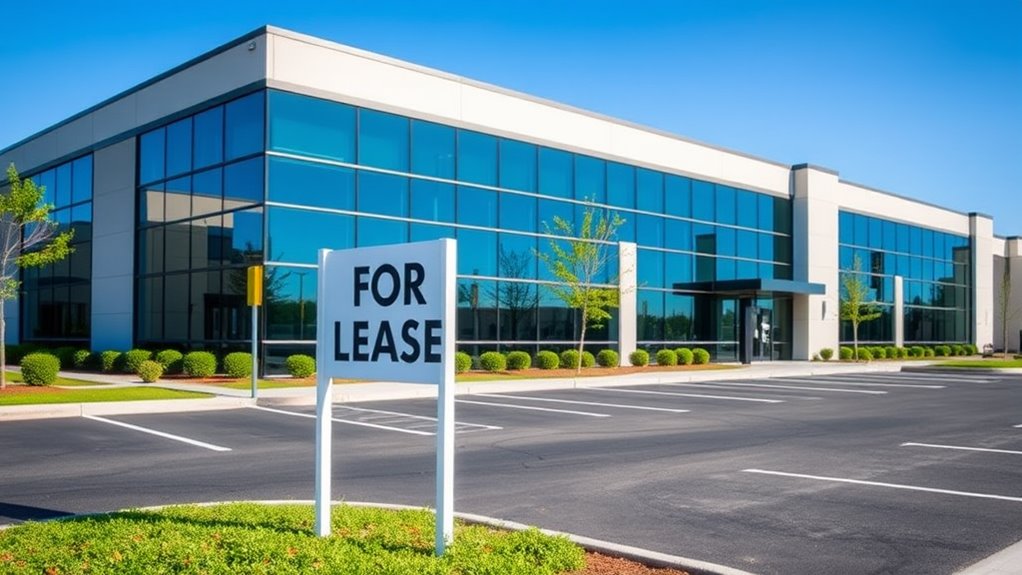Triple net leases (NNN) shift property taxes, insurance, and maintenance costs to tenants, offering landlords predictable income and reduced operational burdens in commercial real estate. Tenants benefit from lower base rents and direct control over expenses, though they assume financial risks like unexpected repairs or tax increases. Compared to gross or modified leases, NNN agreements provide clarity and flexibility but require careful negotiation to cap costs and define responsibilities. Explore further to uncover strategies for maximizing returns and minimizing risks in NNN investments.
Key Takeaways
- Triple net leases transfer property taxes, insurance, and maintenance costs to commercial real estate tenants.
- Landlords benefit from stable income without managing operational expenses in triple net lease agreements.
- Tenants assume financial responsibilities but gain control over maintenance and utility decisions in triple net leases.
- Triple net leases are common in retail, office, and industrial properties due to predictable cash flow.
- Lease terms should include caps on expenses and clear maintenance responsibilities to minimize financial risks.
Understanding Triple Net Lease Structure
A triple net lease shifts the financial burden of building insurance, property taxes, and maintenance expenses directly to the tenant, alongside the base rent. In this structure, you’ll assume responsibility for all operating expenses, including utilities, repairs, and property management fees. While the base rent may appear lower compared to other lease types, you’re effectively absorbing the costs typically managed by the landlord in traditional leases. This arrangement is common in commercial property, particularly for retail stores, office buildings, and industrial facilities, where predictability for landlords is essential. By taking on insurance, property taxes, and maintenance, you gain greater control over the property’s upkeep but also bear the financial risks associated with these obligations. This lease type demands careful budgeting to account for variable expenses, ensuring you’re prepared for fluctuations in costs like insurance premiums or tax assessments.
Benefits of Triple Net Leases for Landlords
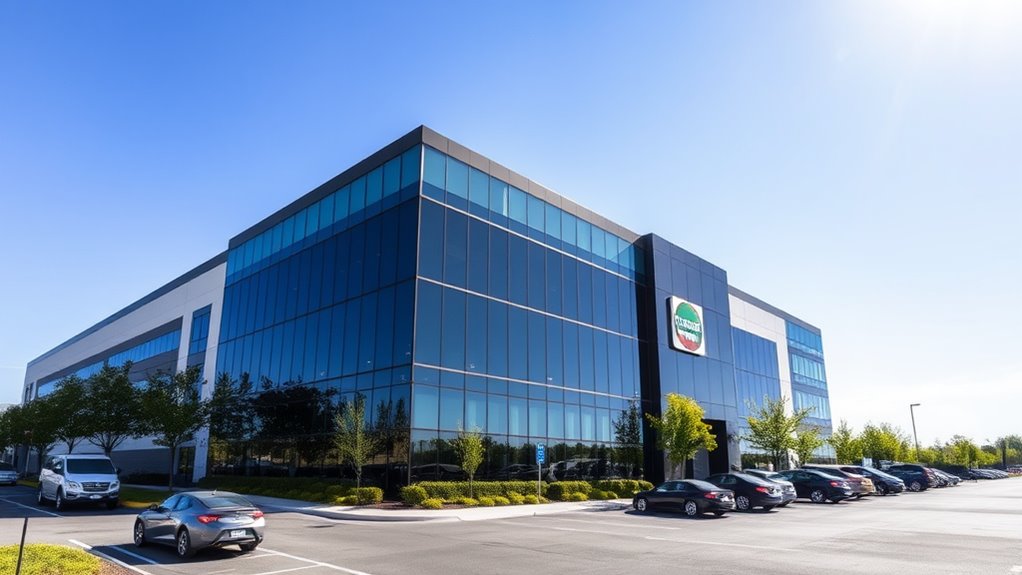
You secure a consistent income stream with triple net leases, as tenants cover property expenses, ensuring predictable cash flow over long-term agreements. By shifting operational responsibilities to tenants, you minimize your management burden and reduce overhead costs. This structure shields you from unexpected financial risks, such as maintenance emergencies or tax hikes. Additionally, utilizing a Long Term Rental Calculator can help you assess the financial viability and potential ROI of your triple net lease investments.
Steady Income Stream
By transferring property expenses to tenants, triple net leases guarantee landlords receive a consistent and predictable income stream. With a Triple Net Lease (NNN), tenants cover rent plus all operating costs, including taxes, insurance, and maintenance. This structure minimizes financial fluctuations, ensuring a steady income stream for landlords over time. You’ll benefit from consistent cash flow, as tenants handle variable expenses, reducing your financial risks. Additionally, most Triple Net Leases include built-in rent escalations, enhancing long-term investment returns by securing reliable revenue growth. These leases often span 10–15 years, providing stability and making them ideal for long-term investment strategies. By shifting operating costs to tenants, Triple Net Leases allow you to focus on maximizing returns without the unpredictability of property expense management. Investment viability is further secured through predictable income streams, making it easier to manage financial planning.
Reduced Management Burden
Since tenants assume responsibility for maintenance, insurance, and property taxes under a triple net lease, landlords face substantially reduced operational demands. You no longer need to handle day-to-day property management tasks, as these duties shift to the tenant, minimizing your administrative overhead. This structure allows you to focus on strategic decisions rather than coordinating repairs or managing contractors. Your role becomes streamlined to overseeing lease compliance and collecting rent, saving significant time and resources. With the tenant covering most expenses, you eliminate the need to budget for unexpected repair costs or property-related expenditures. As a landlord, you benefit from a predictable, passive income stream without the complexities of active property management. This makes triple net leases an efficient, low-maintenance investment model for long-term financial stability.
Advantages of Triple Net Leases for Tenants
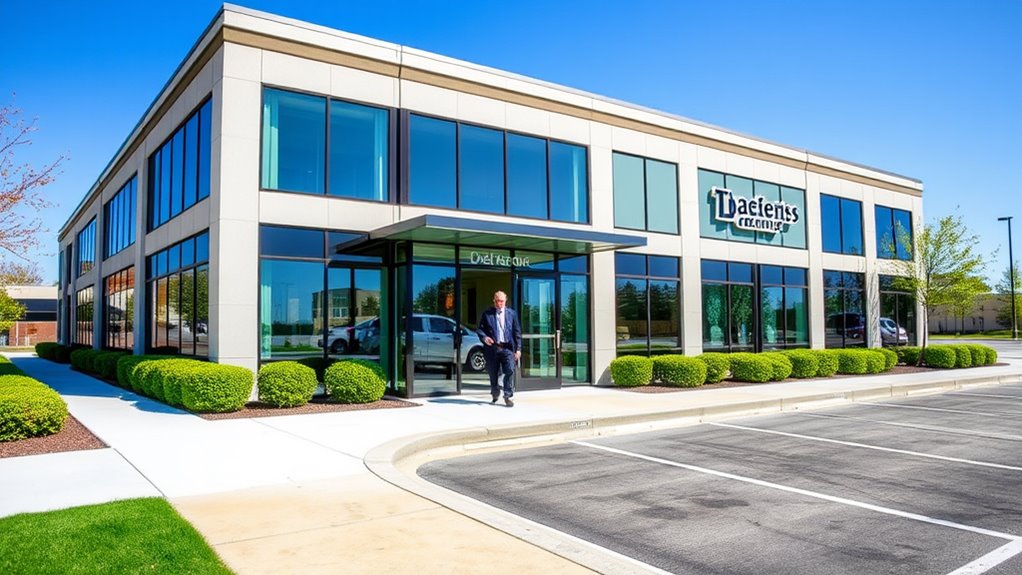
You can secure reduced rental costs by negotiating lower base rents in exchange for assuming property expenses, which often leads to significant long-term savings. With a triple net lease, you gain flexibility in controlling expenses by selecting insurance providers and maintenance services that align with your budget and needs. Additionally, lease terms may include caps on annual expense increases, allowing you to plan your finances with greater predictability.
Reduced Rental Costs
While triple net leases require tenants to cover property taxes, insurance, and maintenance, they often result in reduced rental costs compared to gross or modified gross leases. By assuming these expenses directly, you eliminate third-party markups landlords typically include in base rent, lowering your overall payment. NNN structures allow you to negotiate a lower base rent since landlords transfer financial responsibilities like maintenance costs, taxes, and insurance to you. Additionally, commercial tenants benefit from operating expense caps, which prevent unexpected spikes and enhance budget predictability. Property tax payments included in triple net leases may also offer potential tax advantages, further reducing your net costs. By paying these expenses yourself, you gain greater transparency and can often achieve significant savings compared to traditional lease models. This makes triple net leases a financially efficient choice for many commercial tenants. The longer lease terms of commercial properties in NNN leases also ensure stable cash flow for both landlords and tenants.
Expense Control Flexibility
Triple net leases grant tenants direct control over operating expenses, such as maintenance, utilities, and insurance, providing a level of flexibility not found in other lease structures. With an NNN lease, you’re responsible for managing overhead costs, including property taxes, common area maintenance, and building repairs, which allows you to tailor spending to your specific needs. This structure eliminates the unpredictability of shared expenses, offering a more predictable monthly cost. During the lease term, you can select preferred vendors and contest excessive property tax assessments, potentially reducing costs. The lease agreement places responsibility for maintenance decisions in your hands, enabling you to prioritize and customize upkeep. By directly managing these variables, you gain greater expense control, ensuring your budget aligns with operational priorities while minimizing financial strain. Investing in real estate properties under a triple net lease can also provide robust sources of rental income, enhancing your financial stability and growth.
Potential Risks in Triple Net Lease Agreements
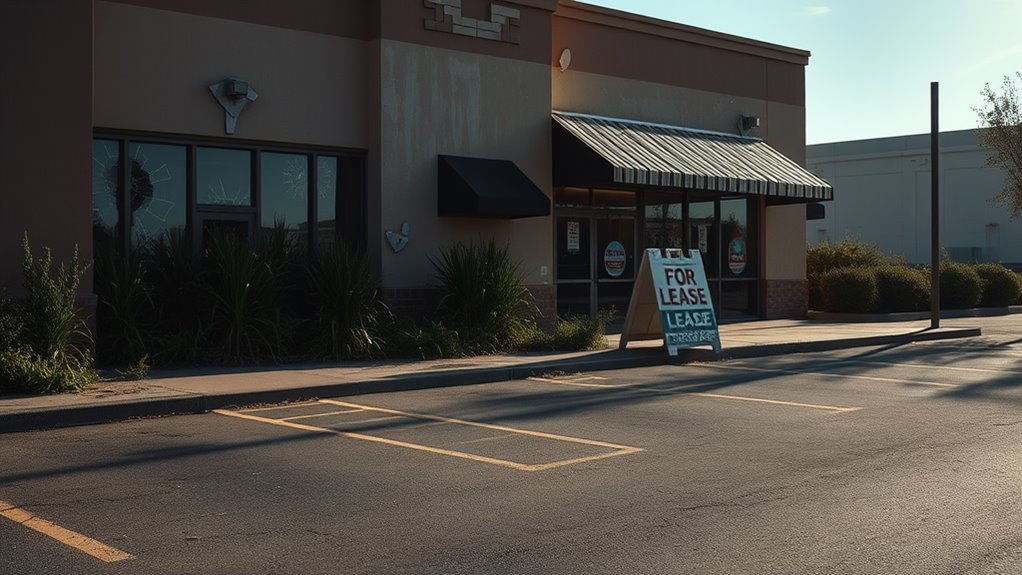
Although triple net leases offer significant benefits to landlords, they also carry inherent risks that can impact financial stability. Tenant bankruptcy or default can lead to full vacancy, exposing you to re-leasing challenges and lost income. Unanticipated maintenance costs or repair costs, particularly in older properties, may exceed tenant expectations, forcing you to absorb unexpected expenses. Tax increases or insurance cost increases, typically passed on to tenants, can strain their financial capacity, increasing the risk of default. Rollover risk becomes a concern with long-term leases; if tenants choose not to renew, you’re left with a vacant property and potential income gaps. Additionally, investors face credit risk if tenants lack strong financial stability or fail to meet lease payment obligations. Changes in zoning laws can further complicate property usage and development, adding another layer of risk to triple net lease agreements. These risks require careful tenant vetting and lease structuring to mitigate potential financial losses.
Comparing NNN Leases to Other Lease Types
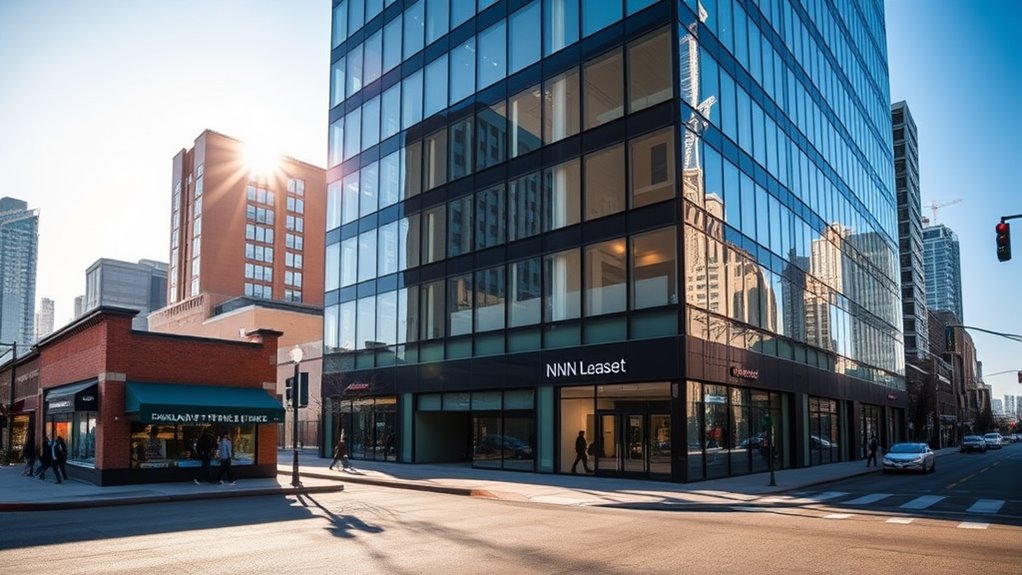
When evaluating commercial leases, understanding the distinctions between triple net (NNN) leases and other lease types is essential for informed decision-making. In a Triple Net Lease, the tenant pays property taxes, insurance, and maintenance, shifting financial responsibility from the landlord. In contrast, gross leases bundle all costs into rent, meaning the landlord must cover expenses. Double net leases require tenants to pay only taxes and insurance, excluding maintenance, while single net leases involve just property taxes, offering less tenant burden than NNN leases. Modified gross leases split operating costs between parties, providing flexibility absent in NNN agreements. Absolute net leases go further than Triple Net Leases by placing all costs, including structural repairs, entirely on the tenant. The financial impact of these lease types varies based on factors like Cap Rate and ongoing cash flow considerations. Each lease type impacts cash flow and liability differently, so carefully assess financial obligations and risk exposure when choosing the right structure for your needs.
Key Considerations for Triple Net Lease Investments

Investing in triple net leases offers stability through long-term agreements, often spanning 10-15 years, but requires careful evaluation of tenant reliability. In commercial real estate, tenant creditworthiness is paramount since NNN leases depend on a single tenant for consistent cash flow. Analyze the tenant’s financial health and history to mitigate risks. Lease terms should explicitly transfer expenses like taxes, insurance, and maintenance to the tenant, ensuring predictable returns. Cap rates for NNN properties typically range from 5% to 7%, influenced by factors such as tenant credit profile, lease duration, and property location. Properties in prime locations often command lower cap rates due to lower perceived risk. Research rent-to-price ratios to identify areas with strong cash flow potential when selecting NNN properties. Additionally, plan your exit strategies carefully, especially for specialized or aging properties, as re-leasing challenges can impact resale value. By focusing on these factors, you’ll enhance the stability and profitability of your Triple Net Lease investment.
Strategies for Negotiating Triple Net Lease Terms
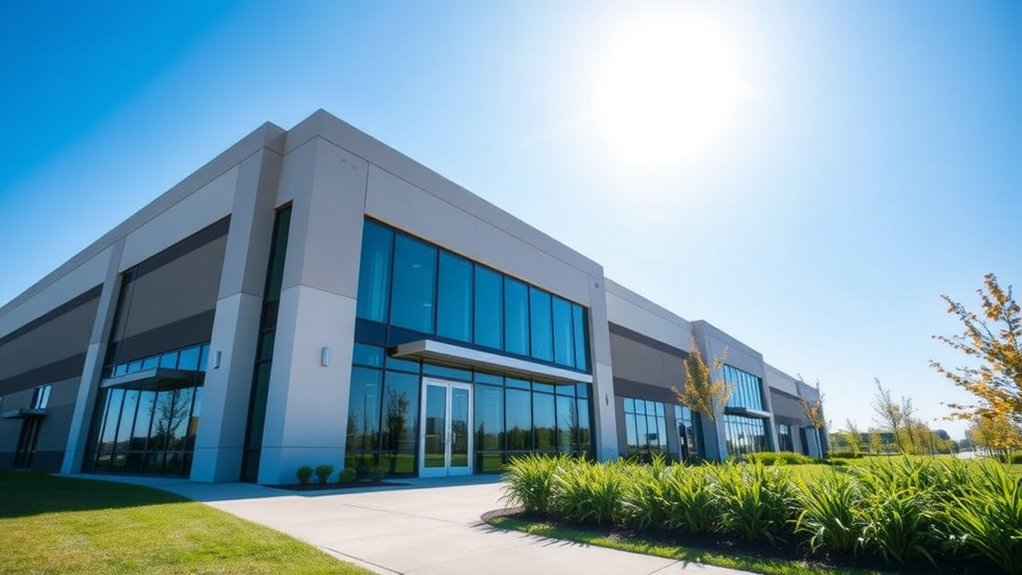
While triple net leases transfer significant responsibilities to tenants, negotiating favorable terms can safeguard your investment’s profitability and mitigate risks. In a Triple Net Lease (NNN), you’re responsible for paying property taxes, insurance, and maintenance, which are in addition to the lease amount. To protect yourself, negotiate caps on operating expenses to limit unexpected liabilities. Clarify maintenance responsibilities, specifying whether structural repairs fall on landlords or tenants. Request detailed expense records to guarantee transparency for taxes and insurance payments. Leveraging emotional intelligence during negotiations can help build trust and uncover hidden concerns, ensuring a more favorable outcome.
| Negotiation Strategy | Purpose | Example Outcome |
|---|---|---|
| Cap on expenses | Limit cost overruns | Tenant shields against spikes |
| Maintenance clarity | Define repair responsibilities | Structural repairs on landlord |
| Detailed expense records | Verify transparency | Accurate tax and insurance tracking |
Seek shorter lease terms or renewal options for flexibility and include rent escalation clauses tied to inflation or market rates to protect long-term financial interests.
Conclusion
Triple net leases are the Swiss Army knife of commercial real estate, offering versatility and predictability. You’ll find they balance landlord and tenant interests by shifting operating costs, ensuring stable cash flows for you while granting tenants control over property expenses. However, scrutinize lease terms for hidden risks like unpredictable maintenance costs. Compare NNN leases to gross or modified gross leases to align with your investment strategy. Negotiate carefully—every clause shapes your financial trajectory.

